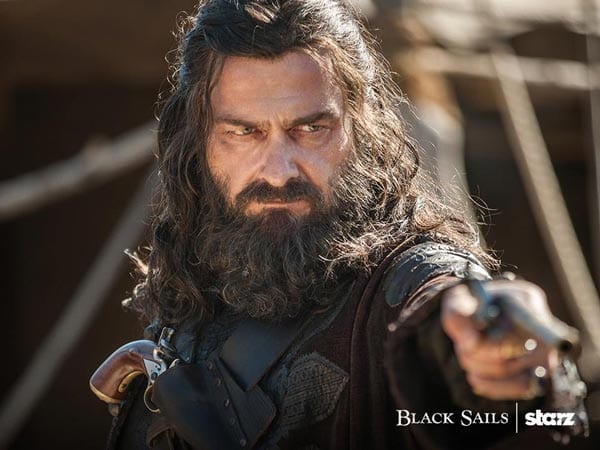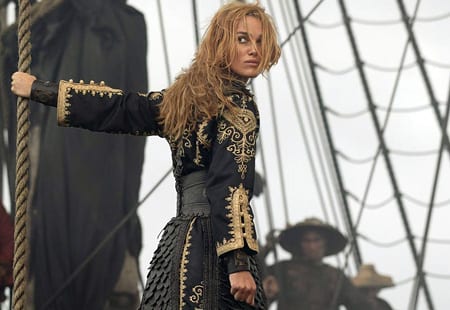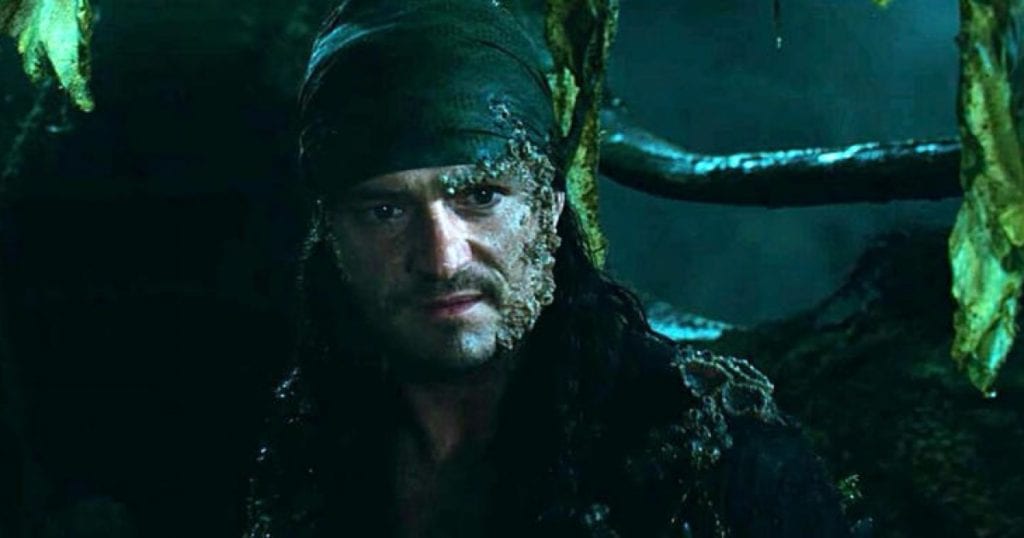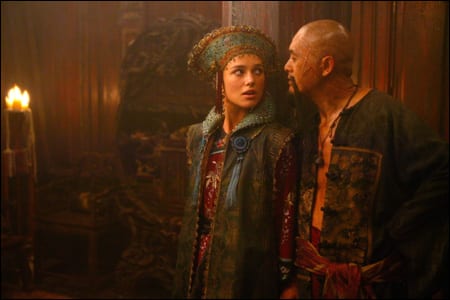For all its faults, the Pirates of the Caribbean franchise was a formative part of my childhood. I wasn’t even a teenager when the third movie was released, and I’ll always be fond of the original trilogy. Yes, the ship battles no longer seem as as grand as the trailers promised, and the films’ magical element grew more unwieldy with each installment, but I like The Curse of the Black Pearl, Dead Man’s Chest, and At World’s End. However, I have a lot of issues with On Stranger Tides and Dead Men Tell No Tales.
To be blunt, On Stranger Tides is a bad movie with very few redeeming qualities (not exactly the movie you should have picked for your international career debut Àstrid Bergès-Frisbey). The mermaids’ theme is beautiful, but Blackbeard is a shitty villain with little-to-no motivation.

But even if I can’t forgive a bad movie, I can eventually forget it. With time, On Stranger Tides can become Pirates of the Caribbean weird movie that we can collectively ignore because it is a stand-alone story with little impact on any characters. That’s not the case of Dead Men Tell No Tales. Not only is it bad, it also permanently damages the franchise by ignoring established canon, which I can neither forgive OR forget. So, let’s set sail on the seas of analysis, to discover just how much of an incoherent mess Dead Men Tell No Tales is.
Dead Men Tell No Tales is set something like 20 years after the end of At World’s End and features the return of characters with central importance to the franchise: Elizabeth and Will. I was as exited as everyone else to see them back, especially Elizabeth. It would have been great if, you know, the writers had any idea who these characters are.
Elizabeth
Elizabeth is a great female character. Resourceful, clever, a good liar, knows what she wants, protective of who she loves, and ready to fight for but also to sacrifice others, she is most often headcanoned as a Slytherin and I have to agree (also she is still the Pirate King until proven otherwise). Her appearance in this movie is closer to a cameo than an active role in the story, and therein lies the problem.
Elizabeth and Will’s son, Henry, is one of this installment’s main characters (even if he has the charisma of raw kale). He is on a quest to find Poseidon’s Trident, which should have the power to free his father from his curse. In order to do so, he becomes a common sailor in the English Navy, where he is treated terribly, and at one point even condemned for treason.
So am I to believe that Elizabeth allowed her only son to become an underpaid mistreated sailor? As many of you know from watching Black Sails, ‘recruitment’ to and working conditions on merchant and military ships contributed greatly to the Golden Age of Piracy. Elizabeth might not be really keen on the English Navy after, you know, everything that happened in the first three movies. She is the Pirate King. So, yeah, that’s unlikely.
Or perhaps young Henry Turner ran away without his mother consent, which makes sense, considering who both his parents are. However, am I supposed to accept that after her son’s departure, Elizabeth did nothing to find him? Elizabeth Swan-Turner, Pirate King, who let Jack Sparrow be eaten by the Kraken to save Will and everyone else, did nothing to get her only son out of danger? Or even to find out where he was? No, no, and no. If that were the case, then half-way through the movie this should have happened:

Finally, Henry left to find a way to free his father from his curse—as though Elizabeth wouldn’t also be interested in doing exactly that? The Elizabeth we saw in the first three movies would have been an active part of that expedition. The only way for this scenario to be coherent with her established characterization would have been for her to a much larger role in the film. The writers should have at least produced a really good explanation for why Elizabeth suddenly found her sitting room way more important than her husband and son.
Will
Will’s poor characterization is less atrocious, or at least less evident. If you recall, at the conclusion of At World’s End Will became the new captain of the Flying Dutchman, replacing Davy Jones. His role is to guide the souls of the people who die at sea to the afterlife and in exchange he is immortal. However he can only go back on land for one day every 10 years.
It is more than implied that Davy Jones ended up turning into an octopus-man because he didn’t fulfill these conditions. So technically as long as Will did his job of guiding the souls he shouldn’t have been of at any risk of fish-ization. And yet this what he looks like at the beginning of Dead Men Tell No Tales:

Did Will start being sloppy or straight up ignoring his task as Davy Jones once did? Will doesn’t strike me as the kind of person who would jeopardize his life, relationship with his family for petty reasons. Maybe he had a fight with Elizabeth? That would explain why she didn’t end-up looking for the Trident herself. But their reunion at the end of the movie contradicts this. So no, Will doesn’t have any reason to turn into Fishman 2.0, if he is in character. Which leads me to the following hypothesis:
No one on this writing team bothered to understand how the magic and mythology of Pirates of the Caribbean work.
The Canon of Pirates of the Caribbean doesn’t make any sense any more, thanks to Dead Men Tell No Tales
Here are some rules that were established in the previous movies:
- Calypso is the goddess of the Sea and she had been freed at the end of the third movie.
- Calypso is responsible for the Flying Dutchman curses.
- The souls of the people who die at sea need to be guided to the afterlife or they wander without end.
- Davy Jones is dead.
Now let’s have a look at what the movie got wrong.
Everybody forgot Calypso
They are looking for Poseidon’s Trident, which is such a powerful tool that it could undo all curses linked to the sea, including the Flying Dutchman one. This is so obviously nonsensical, that I could leave it at that. But hey, let’s rant!
There is a dude conveniently named Poseidon (the god of the sea in Greek mythology) whose trident can overpower Calypso the goddess of the sea (whose name also come from the Greek mythology). Who is Poseidon and how can he be more powerful than Calypso?
A coherent explanation would be to say that Calypso and Poseidon are one person/god. Calypso has the ability to shape-shift (when she turns into thousand crabs) so maybe I shouldn’t be using “she” for her but rather “they.” Calypso could be an entity without gender who can pretty much take any form they fancy and is therefore known under different names. That could work and it would be pretty cool, except for two reasons.
Firstly, Calypso is free. If someone was trying to steal/destroy their trident and make them loose their dominion over the sea, they would do something about it. They wouldn’t sit back and watch two crews make their kingdom crumble.
Secondly, Calypso sadly isn’t known under any other name or gender in the Pirates of the Caribbean canon. Remember this guy:

Captain Sao Feng is a Chinese pirate and he is looking for Calypso. In thiscene he thinks Elizabeth is Calypso for another reason, but also because Calypso is a woman. He also calls her Calypso. If Calypso was known under different names why would a Chinese pirate refers to them under their Greek name and not their Chinese name?
We can only conclude that Calypso is a goddess whose only name is Calypso. She and Poseidon are different beings and she has nothing to do with his trident.
Maybe the mythology in Pirates of the Caribbean is way more complicated that we were lead to believe! Maybe Poseidon is the over-lord of Calypso, the sea is governed by a Triumvirate, or they take turns being the god of sea! But we are given no such explanation. Dead Men Tell No Tales simply forgot that there was a pre-existing canon and that it couldn’t get away with “Shut up it’s magic!”
The curse of the Flying Dutchman
Leaving aside the fact that there is no good reason for Will to turn into shell-man, the film has other continuity problems concerning the curse of the Flying Dutchman. Sure, it sucks to be stuck on a boat for ten years. However it doesn’t excuse not remembering why this “curse” exists in the first place.
At the end of Dead Men Tell No Tales the curse is lifted. What happens to the souls who need guidance? Without the Flying Dutchman they are left to wander. We know that this would piss of Calypso(cf her reaction when she see the souls in At World’s End), so she should react to the absence of the Flying Dutchman. Yet, she is nowhere to be seen, as if the original task of the Flying Dutchman was completely lost on the writers.
Will should be dead. He died at the end of At World’s End, and was only able to come back because Elizabeth and Jack made him ‘kill’ Davy Jones. It is the curse which brought him back. His normal mortal existence was over. So when the spell is broken he should die since nothing is here to keep him alive anymore. But no he doesn’t, because no one at Disney bothered to check why this curse was created in the first place.
Davy Jones isn’t Dead
Davy Jones was a good villain, which Pirates of Caribbean has lacked since his death. But that alone isn’t a compelling reason to bring him back, especially the way it was done.
Davy Jones had his heart pierced-through at the end of At World’s End. According to all previously established rules, he should be dead. There is no jurisprudence for bringing back character which were killed my natural means in Pirates of the Caribbean. Additionally, if Davy Jones effectively found a coherent way to come back he shouldn’t look like octopus-man anymore since you know: THE CURSE WHICH MADE HIM LIKE THAT WAS BROKEN.
The nail in the coffin: Weird Timeline
The main female character in this movie is Barbossa’s daughter Carina. That leads to one of the few genuinely emotional scenes in the movie, when Barbossa sacrifices himself to save Carina just when she’d discovered he is her father. This is one of the rare things I liked in this movie. Unfortunately it doesn’t add up.

Carina is around the age of Henry. Which means that Barbossa would have had to have met her mother somewhere around the events of At World’s End. But the movie implies that they met much earlier. Jack says that he knows the mother, but he was in another world between Dead Man’s Chest and At World’s End, and he and Barbossa parted ways after At World’s End. So for Jack to know Carina’s mother as he claimed, she and Barbossa would have had to be together before the Black Pearl got cursed. Carina should be at the very least 30.
But again, no one checked, because I guess a franchise having internal consistency is asking too much of Disney.
Conclusion
Dead Men Tell not Tales is a bad movie. It could have had no consequences, but it does. Its failure to respect previously-established canon means that now any future Pirates of Caribbean installment will have to take into account Dead Man Tell No Tales. Either the next movie will try and fail to explain everything, or each movie will get successively more and more incoherent.
I can’t forgive or forget that, so I will remember and resent.

